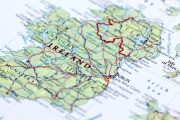
The migration tsunami that swamped Europe with 1.5 million “refugees” in 2015 is roaring back with a tidal wave that may be double the size of last year’s deluge. In fact, most citizens of the European Union countries appear to be unaware that their unelected and unaccountable rulers at the European Commission, in their own European Economic Forecast report issued last fall, announced precisely that. That is, they projected (with apparent acceptance and approval) that three million refugees/migrants would arrive in Europe in 2016.
The warming spring/summer weather along the Mediterranean now means calmer seas are returning, which means many of the hundreds of thousands of migrants encamped along Africa’s northern coast, particularly in Jordan and war-wracked Libya, will soon be headed to Greece and Italy on boats.
According to a recent report for Spiegel International Online, website of the German daily Der Spiegel, the double whammy projected by the EU Commission is already starting out to be, actually, a triple or quadruple whammy, in terms of magnitude in comparison to 2015. “Europe continues to focus primarily on the war refugees coming from Syria, Iraq and Afghanistan,” notes Der Spiegel correspondent Walter Mayr. “But it is often forgotten that increasing numbers of people from countries south of the Sahara are trying to head north as well. In 2015 alone, according to the European Union border control agency Frontex, 108,000 Africans made their way illegally to Europe. That represents an increase of 42 percent over 2014 — and experts believe the total is but a harbinger of what Europe may soon be facing.”
“In March alone, Italy registered 9,676 refugee arrivals — four times more than in March 2015,” wrote Mayr. “Even more alarming, refugees from Syria and Afghanistan — groups that have been most affected by the closure of the Balkan Route — haven’t yet returned to the path across the central Mediterranean,” Der Spiegel reports. “Currently, the migrants arriving in Italy mostly come from Nigeria, Gambia, Senegal and Guinea, despite the fact that their asylum applications are likely to be rejected, as is the case for most of those coming from Africa. Less than 30 percent of asylum applicants from Nigeria or Mali, for example, can expect to have their asylum applications approved in the EU.”
However, being rejected doesn’t necessarily mean being ejected; many whose application for asylum status is rejected manage to slip away into the EU’s migrant underground while their cases are being considered. Relocating them can be an impossible task.
New Tactic for “Cheap Ticket” to EU: Send Distress Call, be Rescued
The human smugglers who are bringing the migrants to Europe have struck on an ingenious tactic that allows them to transfer much of the risk and cost of their smuggling operations to the backs of the EU taxpayers. Der Spiegel explains
Intelligence agencies are warning that hundreds of thousands of people are now waiting in North Africa for their chance to flee across the sea. Particularly from Libya, the dream of Europe looks closer than ever before: The often inadequately equipped boats put to sea by the migrant smugglers must only leave Libyan territorial waters 12 nautical miles from shore before sending out a distress call. Ships patrolling the waters of the southern Mediterranean as part of the EU operation Sophia must then collect them in accordance with international maritime law. Since September, some 13,000 migrants have been brought to EU territory as a result of this tactic.
“Recently, Austrian Foreign Minister Sebastian Kurz warned of the procedure,” notes Mayr, “calling it a cheap ‘ticket to Europe.’ At a meeting in Luxembourg a week ago Monday, he and his EU counterparts offered assistance to the largely powerless Libyan prime minister to build up a coast guard. The reality, though, is that as long as the Libyan authorities refuse to grant EU ships permission to patrol Libyan territorial waters in their efforts to combat smugglers, the surge of migrants heading for Europe will not abate.”
Meanwhile, unwilling to wait for Italy to take sensible action to stem the migrant flow, Austria has begun building fences at four of the country’s border crossings with Italy, including, most importantly, at the Brenner Pass, the heavy traffic route through the Alps. Likewise, Hungary and its Balkan EU neighbors have joined Austria in defying the EU Commission, reinstituting their own border controls, contrary to the open borders-free movement terms of the EU’s Schengen Treaty.
The EU Commission responded today with two contradictory actions, each aimed at mollifying opposing camps in the migration debate. On the one hand, the Commission approved extending for six months the border controls put in place by some of the Schengen countries — for “emergency” purposes, because of the migration crisis. This is largely a face-saving measure, since the EU really could not enforce any stronger measure to undo the de facto border controls that Austria and its neighbors have put in place. On the other hand, the Commission revealed its true colors by also proposing today that the European Parliament adopt the Commission’s plan to grant visa-free travel rights to Turkey’s 80 million Muslims. This is a huge development that, if adopted, would signal the end of Europe. Disregarding completely the security issues (terrorism, crime, subversion, etc.), the economic strain alone from the millions of poor, unemployed, uneducated Turks waiting to get into the EU would be sufficient to sink the continent.
Photo of refugees at the Greece-Macedonia border: AP Images
Related articles:
Here Comes the Obama/UN Refugee “Surge” — Rebranded as “Safe Alternative Pathways”
Mexican Cartels Moving Terrorists Across Southern U.S. Border
First “Refugee” Family Arrives in Kansas City Under New Obama “Surge” Program
Globalists Exploiting the “Refugee Crisis” They Caused (VIDEO)
Refugee Controversy Hits U.S. Heartland
Obama’s Two-front Migration “Surge”
Is Obama’s Refugee “Surge” Coming to Your Town?
Architect of EU Refugee Disaster Links TPP-TTIP “Trade” Treaties




